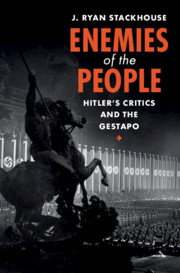Book contents
- Enemies of the People
- Enemies of the People
- Copyright page
- Dedication
- Contents
- Figures
- Tables
- Preface
- Acknowledgements
- Introduction
- 1 National and Regional Foundations, 1933–1945
- 2 Criminalizing Conversation, 1933–1934
- 3 Defining Opposition, 1935–1939
- 4 Discovering Offences, 1935–1943
- 5 Confirming Culpability, 1935–1943
- 6 Cooperation and Ascendancy, 1935–1939
- 7 Principles of Internal Security, 1939–1942
- 8 Enforcing People’s Community, 1939–1942
- 9 Total War Policing, 1943–1944
- 10 Involving the Party, 1943–1944
- 11 Death Throes, 1944–1945
- Epilogue
- Notes
- Bibliography
- Index
7 - Principles of Internal Security, 1939–1942
Published online by Cambridge University Press: 08 October 2021
- Enemies of the People
- Enemies of the People
- Copyright page
- Dedication
- Contents
- Figures
- Tables
- Preface
- Acknowledgements
- Introduction
- 1 National and Regional Foundations, 1933–1945
- 2 Criminalizing Conversation, 1933–1934
- 3 Defining Opposition, 1935–1939
- 4 Discovering Offences, 1935–1943
- 5 Confirming Culpability, 1935–1943
- 6 Cooperation and Ascendancy, 1935–1939
- 7 Principles of Internal Security, 1939–1942
- 8 Enforcing People’s Community, 1939–1942
- 9 Total War Policing, 1943–1944
- 10 Involving the Party, 1943–1944
- 11 Death Throes, 1944–1945
- Epilogue
- Notes
- Bibliography
- Index
Summary
The war restructured the justice system. Hitler, haunted by the “stab-in-the-back” of 1918, assigned the courts and the Gestapo new roles to safeguard morale. The courts would issue severe sentences to deter dissent, while the political police would ensure that only true opponents faced prosecution. Draconian punishments checked defeatism, while descriptions of the convict preserved support by communicating who was targeted and why. The Gestapo enabled these sentences by resolving lesser offences. Heydrich issued new Principles of Internal State Security during the War authorizing warnings to “correct the mindset and strengthen the will” of supporters who strayed in “momentary weakness.” The new policy also permitted extrajudicial executions to “brutally liquidate” any serious threat to morale. Practically, very little changed about who and what kinds of behavior were a threat. The new policy continued targeting political opponents, criminals, and public offences. Previously, officers had intervened on a case by case basis. Now, station leaders bore personal responsibility for deciding whether to press charges. Selective enforcement passed from the state prosecutor to the Gestapo.
Keywords
- Type
- Chapter
- Information
- Enemies of the PeopleHitler's Critics and the Gestapo, pp. 168 - 179Publisher: Cambridge University PressPrint publication year: 2021

